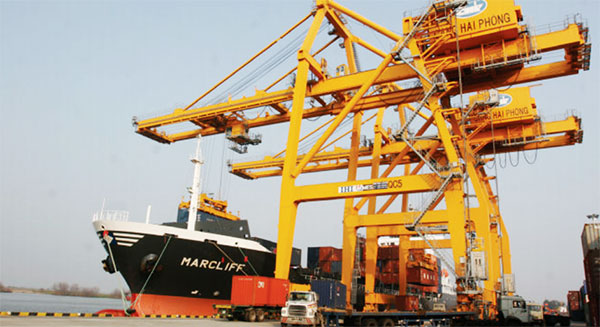Export-import firms decry new Haiphong policy
 |
| illustration photo |
Recently, Vietnam Chamber of Commerce and Industry (VCCI), which represents the Vietnamese business community, sent a proposal to the prime minister concerning Haiphong’s new fee policy.
This came after a series of businesses and business associations raised their voices about irrational fee collections at city-based ports as well as the lack of goodwill in seeking remedy from local authorities.
In VCCI’s proposal, Vietnam Cotton and Fibre Association and other VCCI members claimed that with the application of the Haiphong People’s Council’s Resolution 148, each yarning business of medium and large scale that exports between 150 and 400 containers (40 feet) per month will need to pay from VND900 million ($41,000) to VND2.4 billion ($109,000) more in fees annually.
Other export-import businesses expect to spend additional tens of thousands of US dollars in customs clearance each time.
This has brought new burdens to businesses despite already shouldering a multitude of fees, such as for road and bridge usage, many of which have also been increasing quickly, like BOT fees.
Businesses claim that the fees mentioned in Resolution 148 rose nearly 70 per cent, some even doubled.
In particular, the fees for using infrastructure, service facilities, and public utilities at city-based seaports had been upwardly revised in 2015, and then sharply increased in late 2016.
In addition, to get through city-based seaports, export-import firms need to pay a new infrastructure fee. It takes between 30 minutes and one hour to complete the procedure, irrespective of preparation time and unexpected arising hurdles.
“Through imposing new fees and hiking old ones, Resolution 148 of Haiphong city proves to go counter the spirit of the government’s newly-released Resolution 35-2017, which seeks to reduce business expenses, one of the five measure groups set in Resolution 35,” said VCCI Chairman Vu Tien Loc.
Loc assumed that the enactment of Resolution 19 confirms the government’s commitment to pushing up administrative reforms, particularly the simplification of customs and export-import procedures to ensure fast and smooth customs clearance.
Several localities have presented new policies lengthening customs clearance, which could be considered a step back from the government’s objective.
Another irrationality pointed out by VCCI is that there were only 17 days between the enactment of the decision and its coming into effect, which was not enough for firms to prepare, despite the major impact on their rights and benefits.
In its proposal, VCCI argued that this could create a dangerous precedent prompting other localities with seaports and airports to follow suit and create new fees, which could hinder firms’ operations.
The Government Office, after receiving information about the case, has gathered comments from related parties (ministries, Haiphong authorities and businesses) and assigned an authorised agency to make an in-depth analysis to find a suitable remedy for submission to the prime minister.
Vietnam Private Business Forum (VPSF) is contacting relevant ministries to garner comments about the case, possibly preparing for direct dialogues between the related parties early next week.
What the stars mean:
★ Poor ★ ★ Promising ★★★ Good ★★★★ Very good ★★★★★ Exceptional
Latest News
More News
- Foreign leaders extend congratulations to Party General Secretary To Lam (January 25, 2026 | 10:01)
- 14th National Party Congress wraps up with success (January 25, 2026 | 09:49)
- Congratulations from VFF Central Committee's int’l partners to 14th National Party Congress (January 25, 2026 | 09:46)
- 14th Party Central Committee unanimously elects To Lam as General Secretary (January 23, 2026 | 16:22)
- Worldwide congratulations underscore confidence in Vietnam’s 14th Party Congress (January 23, 2026 | 09:02)
- Political parties, organisations, int’l friends send congratulations to 14th National Party Congress (January 22, 2026 | 09:33)
- Press release on second working day of 14th National Party Congress (January 22, 2026 | 09:19)
- 14th National Party Congress: Japanese media highlight Vietnam’s growth targets (January 21, 2026 | 09:46)
- 14th National Party Congress: Driving force for Vietnam to continue renewal, innovation, breakthroughs (January 21, 2026 | 09:42)
- Vietnam remains spiritual support for progressive forces: Colombian party leader (January 21, 2026 | 08:00)
















 Mobile Version
Mobile Version